|
What
have Klamath Water Users done all year?
KWUA
annual meeting
2/16/07, by
Jacqui Krizo, KBC editor
It has been an intense year for Klamath Water
Users Association board of directors and
committee members. With power rate increases,
(FERC) Federal Energy Regulatory Commission
negotiations, lawsuits against the irrigators,
and regulations on lake levels, river flows,
and water quality, all on the shoulders of the
irrigators, KWUA held its annual meeting to
update their community. President Steve Kandra
emceed the Thursday meeting at the Klamath
Fairgrounds attended by more than 70 people.
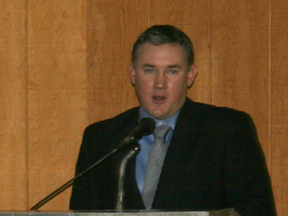 |
Power
committee chairman Scott Seus gave an
update on the power situation. He said
KWUA started in '54 to protect irrigation
and power rates. The power company Copco
offered affordable power rates to
irrigators since the Klamath Project
offered benefits to the power company:
reliable, regulated cheap water to produce
low-cost power for all of their customers.
In '98 KWUA prepared for the upcoming
renegotiation of Project power rates. They
met with PacifiCorp but had no success
talking with them. Rather than being a
partner like before, the power company had
become a large corporation; they did not
care that the Project provided "power and
food for a hungry nation." When Klamath
Water Users' contract expired in 2006,
PacifiCorp would not allow the irrigators
an affordable rate. Seus said this was
after 80 years history of 'credit for
value', water benefits for power rate
payers. |
Seus complimented Oregon Senator Doug Whitsett
who wrote a bill providing Oregon irrigators a
seven-year gradual increase in their power
rates.
Attempts to negotiate a similar phase-in in
California were less successful; they have a
four-year transition to tariff rates. No
recognition was given to the fact that without
the Klamath Project paid for by the
irrigators, there would be no reliable
regulated water for power on the Klamath
River. The hydro dams provide power for 70,000
households.
Water Users are now participating in FERC
settlement negotiations.
| Klamath Irrigation Manager and science
committee chairman Dave Solem addressed
the group on the
National Research Council (NRC) review and
reconsultation.
The NRC is currently reviewing two
reports, one on upper basin hydrology and
one on fish habitat, water quality and
river flows. They are peer-reviewing the
Bureau of Reclamation Natural Flow study
and Dr. Hardy studies and will identify
gaps in the reports.
The NRC met in Sacramento in February
2006, Yreka in October, and Klamath Falls
January 29th. Their focus at the January
meeting was on the Bureau's undepleted
flow study.
Marc Van Camp from MBK Engineers gave
input as well as some Klamath irrigators
and scientists.
|
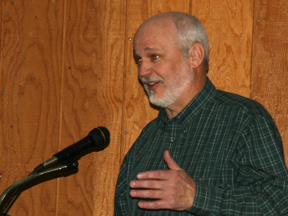 |
Solem explained
that there are two Biological Opinions under
the Endangered Species Act, one for coho
salmon and one for suckers. With
reconsultation between the Bureau and NOAA
Fisheries, by fall there should be a new
Biological Assessment, then a Biological
Opinion hopefully before 2008.
| Area Manager of the
Bureau of Reclamation Pablo Arroyave
began his job in Klamath Falls this past
September. His goal is to add water supply
predictability to resource users, and
stability to water users in the watershed.
He said the February 14 water year
prediction is for a "below average" year
type and expected inflow to Upper Klamath
Lake is in the low end of that year
type. This year there are 166 water bank
applications, down from 200 in '06. There
is a finite amount of money, and
stretching that money as far as possible
is important. The reconsultation on
Biological Opinions is critical and the
agencies are hoping to combine upper and
lower basin interests into one coordinated
Biological Opinion.
He said the Bureau is resolved to
settle the financial issues at a local,
regional and federal level. |
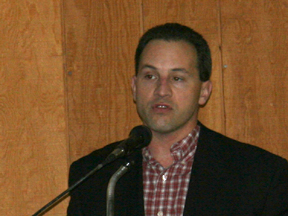 |
KWUA attorney Paul
Simmons said most of the
legal battles in 2006 were related
to power issues.
He said Pacific
Coast Federation of Fishermen (PCFFA) vs
Bureau of Reclamation lawsuit began in 2002
regarding coho salmon. There have already been
three or four court decisions. The '02
biological Opinion set flows for Iron Gate in
three phases to be ramped up over several
years. The '02 BO said the Bureau was not
required to meet those flows totally from the
Klamath Project.
In '06 the 9th
Circuit Court said National Marine Fishery
Service did not explain 'ramping up' the
flows, so the Bureau must immediately provide
third stage flows.
Simmons said
Pacific Legal Foundation is appealing whether
the Klamath Project is required to release
their stored irrigation water down the river
above natural flows. There will be no decision
before the '07 water year.
He said water
rights adjudication is moving along, with
nothing to be settled before '09.
KWUA FERC relicensing began two
years ago. Now there are 28 parties at the
negotiation table. In December and January
KWUA representatives spent five or six days
weekly at the table. He said with the
'confidentiality agreement', the the
participants can not tell the public details
of the negotiations.
However, he said
KWUA positions are not secret. They want
affordable reliable power and secure water
supply. They also need safe harbor, meaning
that they will be exempt from new Endangered
Species Act regulations if endangered fish are
introduced into the Upper Klamath Basin..
Simmons said that
the KWUA board is working very hard to protect
the irrigators.
He said that the
public will be informed of the details of the
settlement and no 'done deals' will occur
before the public is on board.
| KWUA hired Greg
Addington two years ago as
Executive Director of their organization.
Besides the activities explained by Solem,
Arroyave and Simmons, Greg
told about other facets of
KWUA's endeavors.
He said political outreach has been a
focus to acquaint representatives with the
facts and challenges of the local farm
communities.
He said communications and testimonies
have been important with the Secretary of
the Interior, Congress, regional agencies,
state legislators, local officials, the
National Academy of Science.
Media and public relations have been "a
never ending effort" in Klamath National,
regional, local, with radio, television,
newspaper and magazine interviews. They
have contributed to many national
publications and audiences so the
irrigators voices can be heard. |
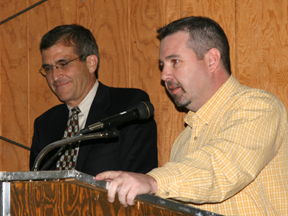
2/15/07.
KWUA Executive Director Greg Addington (r)
presented an award to Paul Simmons at
KWUA's annual public meeting for his
diligence and dedication to Klamath Basin
irrigators' issues. |
Addington said
their website,
www.kwua.org, is an effective tool,
getting nearly 30,000 visitors per year on the
site. There visitors will find updates,
science reports, testimonies and speeches,
news articles, tours, press releases and
calendar of events.
Last year the Water
Users conducted more than ten tours for the
public, media, politicians, regulators and
students.
2006 was a
challenge Addington said, as there were
difficult decisions. The board is striving to
increase funding opportunities with
partnerships, grants and other financial help.
He expressed appreciation for funding from NW
Farm Credit Services, Lost River Ranch,
Klamath and Lake County Farm Bureau, and Jess
Prosser memorial fund. He said he is
cautiously optimistic about the 2007 outlook,
and said KWUA is working to be as effective as
possible.
And what's in the
future? Continuing to advocate for affordable
power and secure water supply, reconsultation,
Farm Bill 07 issues, Clean Water Act/TMDL's,
groundwater issues and settlement
negotiations.
Awards and recognition
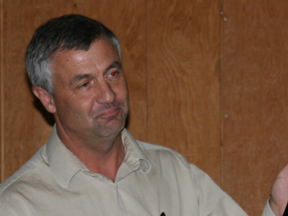
Rob Crawford presents award
to Steve Kandra |
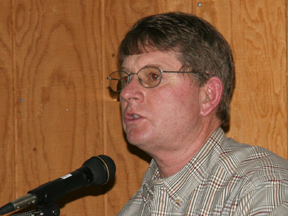
KWUA President Steve
Kandra |
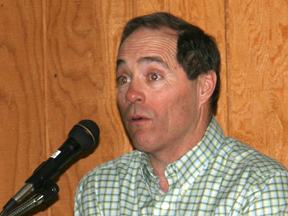
KWUA board member Bob
Gasser |
Greg Addington
presented an award to Paul Simmons for his
diligence and dedication to Klamath Basin
irrigators' issues. He also recognized Dick
Carleton for his efforts coordinating tours
and meetings with Oregon salmon fishermen and
Klamath Basin farmers and ranchers.
| Kandra complimented the hard work of
the board members and committees, and his
wife Nancy for her support. He said Luther
Horsley will be the new KWUA President
when Kandra's term is up next month.
KWUA board
member Rob Crawford presented President
Steve Kandra with a photo collage by
Anders Tomlinson for Kandra's constant
hard work as President of the Board. He
said Steve was often at meetings all day,
then would be on his tractor all night.
Crawford
showed a medley of Tomlinson's films
beginning in 2001 when he filmed and
photographed the water crisis, rallies and
events. It also included parts of a
documentary on the Tulelake homesteaders
'Homesteading in a Promised Land', a film
for Fish and Wildlife, 'Fields of
Splendor' including the basin's wildlife
on farmland habitat, and part of his film
Farmland. |
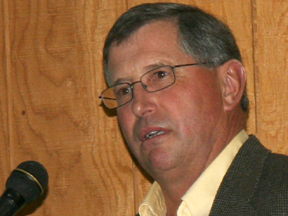
Luther Horsley |
Bob Gasser
continued to compliment the dedication of
Tomlinson and asked people to visit his
website
www.tule-lake.com
Administrative Assistant Mari Gill organized
the evening's refreshments and table settings.
The evening was a stark reminder of the
thousands of hours of endless and often
thankless hard work and stress contributed by
dozens of people trying to preserve their
productive farm community for future
generations.
Klamath Water
Users Association
2455 Patterson Street, Suite 3
Klamath Falls, Oregon 97603
Phone (541) 883-6100
FAX (541) 883-8893
kwua@cvcwireless.net |

